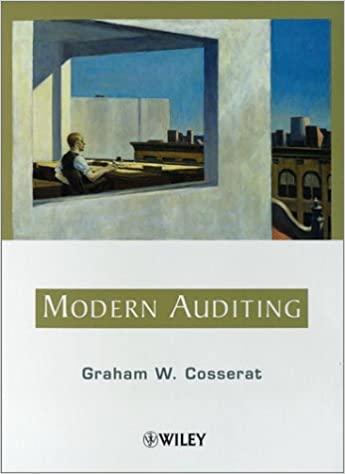Question
Baci is a well-known lollipops maker in Western Australia and produces lollipops in two size, i.e., regular and large. The company sells their products to
Baci is a well-known lollipops maker in Western Australia and produces lollipops in two size, i.e., regular and large. The company sells their products to convenience stores, fairs, schools for fundraisers and in bulk on the internet. 2018 summer is approaching and Baci is preparing its budget for the December. All Bacis lollipops are hand-made, mostly out of sugar, and attached to wooden sticks. Expected sales are based on past experience.
Other information for December 2018 is as follows:
Input prices :
Direct materials:
Sugar $0.50 per kg
Sticks $0.30 each
Direct manufacturing labour $8 per direct manufacturing labour hour (DMLH)
Input quantities per unit of output
Regular Large
Direct materials:
Sugar 0.25 kg 0.5 kg
Sticks 1 1
Direct manufacturing labour hour (DMLH) 0.2 hour 0.25 hour
Set-up hours per batch 0.08 hour 0.09 hour
Inventory data for direct materials1
Sugar Sticks
Beginning inventory 125 kg 350
Target ending inventory 240 kg 480
Cost of beginning inventory $64 $105
1: Baci accounts for direct materials using a FIFO cost flow assumption.
Sales and inventory data for finished goods2
Regular Large
Expected sales in units 3,000 1,800
Selling price $3 $4
Target ending inventory in units 300 180
Beginning inventory in units 200 150
Beginning inventory in dollars $500 $474
2: Baci uses a FIFO cost flow assumption for finished goods inventory.
All the lollipops are made in batches of 10. Baci incurs manufacturing overhead cost, and marketing and general administration costs, but customers pay for shipping. Other 3 than manufacturing labour costs, monthly processing costs are very small. Baci uses activity-based costing (ABC) and has classified all overhead costs for December 2018 as follows:
Cost type Denominator activity Rate
Manufacturing:
Set-up Set-up hours $20 per set-up hour
Processing Direct manufacturing labour hour (DMLH) $1.70 per DMLH
Non-manufacturing:
Marketing & general admin Sales revenue 10%
2. Bacis balance sheet for 30 November 2018 follows. Use it and the following information to prepare a cash budget for Baci for December 2018:
80% of sales are on account, of which 50% are collected in the month of the sale, 49% are collected the following month and 1% are never collected and written off as bad debts.
All purchases of materials are on account. Baci pays for 70% of purchases in the month of purchase and 30% in the following month.
All other costs are paid in the month incurred.
Baci is making monthly interest payments of 1% (12% per year) on a $20,000 long-term loan.
Baci plans to pay the $500 of taxes owed as of 30 November 2018 in December 2018. Income tax expense for December is zero.
40% of processing and set-up costs, and 30% of marketing and general administration costs, are depreciation.
Baci Balance Sheet as of 30 November 2018
Assets
Cash $587
Account receivable $4,800
Less: Allowance for bad debts 96 4,704
Inventories:
Direct materials 169
Finished goods 974
Fixed assets $190,000
Less: Accumulated depreciation 55,759 134,241
Total assets $140,675
Liabilities and equity
Account payable $696
Taxes payable 500
Interest payable 200
Long-term debt 20,000
Ordinary shares 10,000
Retained earnings 109,279
Total liabilities and equity $140,675
require 3. Prepare a budgeted income statement for December 2018 and a budgeted balance sheet for Baci as of 31 December 2018.
Step by Step Solution
There are 3 Steps involved in it
Step: 1

Get Instant Access to Expert-Tailored Solutions
See step-by-step solutions with expert insights and AI powered tools for academic success
Step: 2

Step: 3

Ace Your Homework with AI
Get the answers you need in no time with our AI-driven, step-by-step assistance
Get Started


